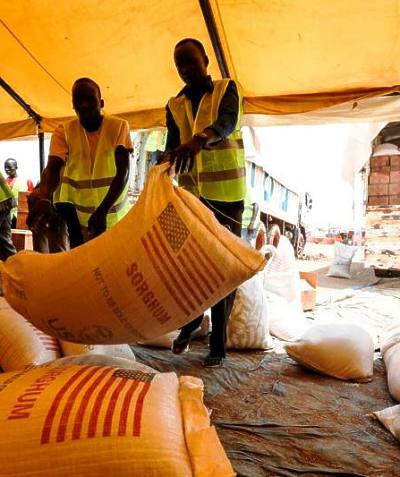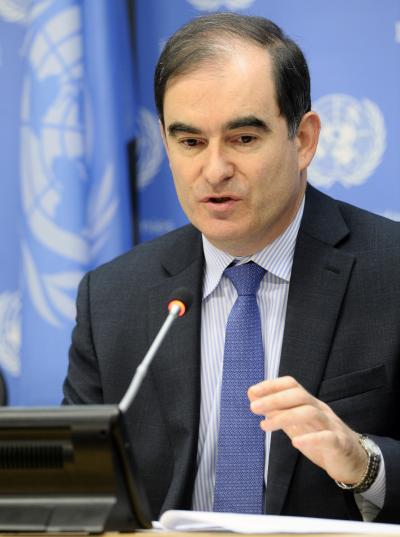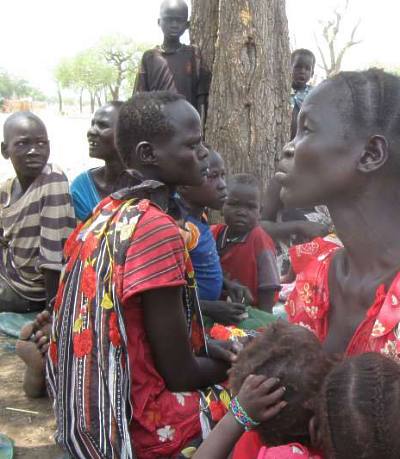 Heavy rains sand flooding in South Sudan have even made the UN's refugee camps uninhabitable © Isaac Billy/UNMISS/afrol NewsAgriculture - Nutrition | Society Famine warning: "South Sudan is imploding"
John Ging, Operations Director of the UN Office for the Coordination of Humanitarian Affairs (OCHA), today cited an urgent need to mobilise funding for the crisis in Sudan, where some 6.1 million people currently need assistance. This represents a 40 percent increase over this time last year.
"You have the newest country in the world now imploding," the UN director stated, noting that the conflict was setting back the very fragile development that was occurring since the country gained independence from Sudan in July 2011. Amid the "senseless brutality", some 700,000 people have been displaced internally, including 67,000 who are sheltering at UN bases around the country, while almost a quarter of a million people have sought refuge in neighbouring countries. One of the major challenges in South Sudan, Mr Ging said, was the lack of respect on the ground for humanitarian staff, convoys, facilities and supplies, and this included delays and checkpoints for convoys. "You have an urgent situation on the ground in South Sudan, and we need the freedom to do the job that we must do, and can do, if we are allowed to do it," he stated. Another major challenge was funding, particularly as the onset of the rainy season draws near. "We are in a race against time with the rainy season fast approaching that we have to pre-position stocks. We really do appeal to our donor community to give us the funding that we need to do the things that we most urgently need to do, in the quickest way possible." "Hope for South Sudan fading away Yasmin Haque from the UN Children's Fund (UNICEF), who until recently served as country representative in South Sudan, today said the events in that country were "tragic". She noted that the conflict has "severely disrupted t
It was now "really urgent" to have funding and services in place to meet their needs, Ms Haque underlined. The conflict had also meant that children were facing grave violations, whether their schools were being occupied, health centres were being destroyed or children themselves were being recruited by the armed groups. Amid the worsening crisis in South Sudan, the UN High Commissioner for Refugees (UNHCR) and the World Food Programme (WFP) this week appealed for US$ 371 million in "urgently needed support" for the thousands of South Sudanese refugees arriving in neighbouring countries. Since fighting erupted in mid-December, 204,000 people have fled to Sudan, Uganda, Ethiopia and Kenya, according to UNHCR. With continuing insecurity and growing food shortages inside South Sudan, the agency expects the number of South Sudanese refugees across the region to reach 340,000 by the end of the year. UNHCR spokesman Adrian Edwards told reporters in Geneva that South Sudanese have recently been fleeing into neighbouring countries at a rate of nearly 2,000 per day, with most heading to Ethiopia and Uganda. Many of the refugees had been arriving exhausted, nutritionally weak and in poor health, having coming from areas of South Sudan experiencing severe food shortages. The majority were women, children and older people. With some 700,000 people displaced inside South Sudan and 3.7 million at high risk of food insecurity, the potential for further cross-border movement was said to be high. By staff writer © afrol News - Create an e-mail alert for Sudan news - Create an e-mail alert for South Sudan news - Create an e-mail alert for Zambia news - Create an e-mail alert for Agriculture - Nutrition news - Create an e-mail alert for Society news
On the Afrol News front page now
|
front page
| news
| countries
| archive
| currencies
| news alerts login
| about afrol News
| contact
| advertise
| español
©
afrol News.
Reproducing or buying afrol News' articles.
You can contact us at mail@afrol.com









